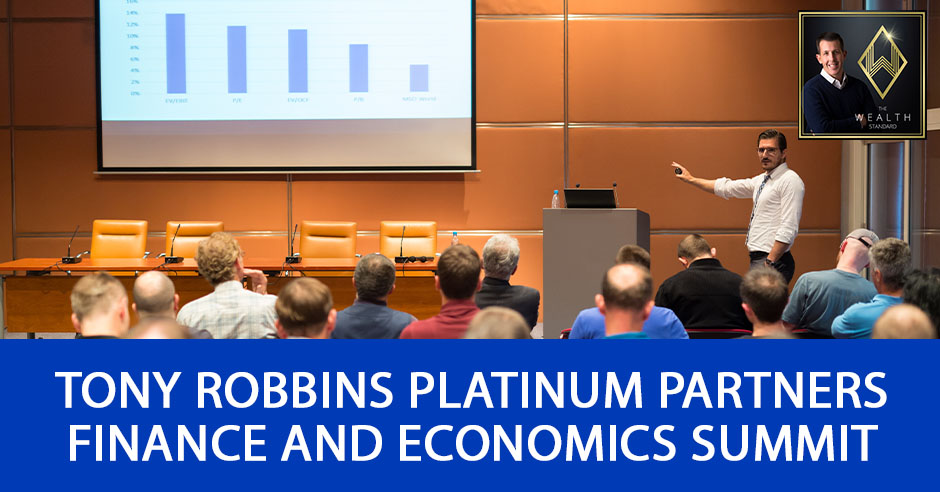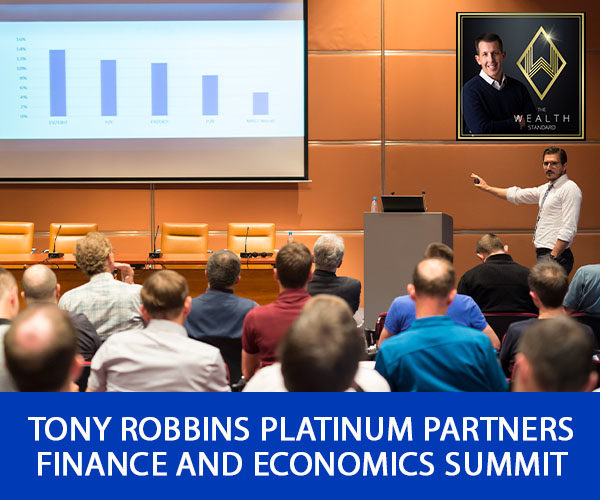Tony Robbins Platinum Partners Finance And Economics Summit
Podcast: Play in new window | Download

Nothing makes us grow more than learning. Patrick takes us into his experience over the last Tony Robbins Platinum Partners Finance and Economic Summit he attended, highlighting three major takeaways that impart great wisdom that contributes to success. He shares what he learned about focusing on the positive, finding the balance between certainty and uncertainty, and knowing the emotional cycles that exist in financial markets – from the big to the small.
—
Watch the episode here:
Listen to the podcast here:
Tony Robbins Platinum Partners Finance And Economics Summit
Financial Friday
I’m going to condense my experience over the last Tony Robbins event that I attended. This is a special one. This is for Platinum Partnership, an inner circle group of Tony Robbins and they do it once a year. It’s purely based on finance and economics. He had speakers like George Bush, Clinton, Bernanke, Greenspan, Ray Dalio, T. Boone Pickens and a lot of other professional investors. I’m going to give you my top three takeaways. However, you can look for the playlist or the videos I did. It basically has four videos I did while I was at the summit that goes through in detail some of the things that I was learning. I’m going to highlight the top three. The first one was interesting. This is a big thing that we all can work on and it’s always going to be the case, which is the idea of focus.
This room was filled with successful people in all walks of life. They have a few billionaires in there. I got to talk to a number of people and it’s probably the most high-level group I’ve ever been around, especially the number. There are about 300 of us there. It was one of those things where it kept coming up over and over again. It’s the notion of focus. Oftentimes, how we’re conditioned is we focus on the things that are not going right or we focus on the problems. We focus on the pessimistic side of things as opposed to what we actually can control and focus on, which is what’s going good, what’s going right. What that does is it provides a different state of mind in regards to how we analyze things, how we take advantage of opportunities, how we experience life. Ultimately, the amount of money or success that you achieve, you’re always going to have that instinctive side of you that is looking for what’s wrong. It’s protecting you. It’s looking out for danger so that you don’t get harmed or hurt. What it tends to do is affect our mind that we’re always focused on the negative, the bad, not necessarily the good. There’s always something good going on.
When the focus is there listing things, you’re grateful for or singing out loud a list of those things that you’re grateful for. Thinking about the blessings that you have or thinking about what is going right and list those, it’s amazing what type of mindset that creates. That’s one of those keys to understanding opportunity is that if you have a pessimistic attitude, you’re not going to see opportunity. Therefore, mindset is key. I know that’s general, maybe it’s not necessarily financial but in my experience, it leads to financial. I have dozens of employees. I have lots of responsibility on my shoulder. I’m a parent, I’m a husband. It’s one of those things where there’s always pressures. There’s always something that’s not going as I want. However, there are amazing things that are going on. When my focus is there, my attitude is so much different. I show up differently, I played differently. I experience life differently. Take that as my first big takeaway.
Second is interesting. This is where I’m determining as the balance of certainty and uncertainty, which I’ve talked about before. Here’s an interesting quote and it’s deeper than I thought when I actually first heard it. The quote is, “The quality of your life is in direct proportion to the amount of uncertainty you can comfortably live with.” Uncertainty as he describes it, it’s variety. It’s adventure. Those are some uncertain things. Uncertainty is what makes life exciting, not boring. Uncertainty can also be very negative if you think about it but at the same time, uncertainty is having fun adventures, surprises, roller coasters, going on trips, exploring new places, learning something new, being with new people. Those are experiences that give life a lot of vitality. If everything was the same over and over again, that repetition is boring and we don’t deal with that well.
We are conditioned to focus on things that are not going right as opposed to what is going good. Click To TweetThe idea is how do you balance certainty and uncertainty? How I look at it is something that Tony uses, which is looking at your financial life with a bucket mentality. I call it a hierarchy in the book I wrote, Heads I Win, Tails You Lose. I talked about the hierarchy of wealth. It’s a very similar concept where you fill up that first bucket, that safety bucket or certainty bucket and it has assets that we’re not going to lose money. Assets that are protected and insured grow to an extent but also allow you peace of mind so that you can start to experience uncertainty and that variety. You do it in a responsible manner and the uncertainty applies to you but it could be having those adventures, doing vacations, doing fun things with your family. The uncertainty could also be pursuing a different position, applying for a new position, applying for a new job. It’s expanding your resume and being more valuable to your employer or another employer, researching things about yourself. It’s basically doing things that are different than they currently are.
That uncertainty is where I believe that he’s referring to. The quality of your life as you’re taking on these new things and you’re growing and expanding, that uncertainty is essentially reinforced and accentuated by a balance of certainty. That was cool to think through because in the end, we’re all looking for a high quality of life. A high quality of life is not redundant things that you’re doing on a day-to-day basis. It’s doing things that are exciting. The pursuit of that is always going to give this fulfillment and excitement. However, to be enjoyed I look at having a foundation, having an offset of certainty when it comes to your financial life.

Tony Robbins: A high quality of life is not about doing redundant things on a day to day basis. It’s doing things that are exciting.
The third thing was interesting. This was brought up a number of times, which is the emotional cycles that exist in financial markets, big markets but also small markets. Sentiment is vital to understand. It’s interesting how we approach things sometimes because when you’re approaching it as a third party observer, we tend to look at things rationally, analytically. However, when we’re in the actual experience, when we’re not observing, we’re actually in there. It’s more of an emotional game than anything else.
One of the speakers was a manager of I think $100 billion, $20 billion, $30 billion. His name’s Howard Marks. He went through and talked about his new book that’s out I believe. It’s one of those things where you would assume that big traders, whether it’s hedge fund traders or VC funds or whomever, that they have it together and they’re not emotional when you have volatility. He basically made the case that they always are. One of the most difficult things in their world when it comes to investment is making decisions based on fundamentals being in line. However, it’s also adding the variable of emotion. If a certain emotional state is not present, that could be a no buy or a buy signal. It’s interesting. I think we’re in this euphoric state where people are bidding up and buying for the sake of it.
If you have a pessimistic attitude, you're not going to see opportunity. Click To TweetAn example that they did at this event was they bid up the price of $100 bill. This is a room full of successful people and Tony made the claim, “Who are my risk takers out there? Who are my ballers out there?” A couple of people raised their hand and he auctioned off a $100 bill. Somebody offered a $150, $200, $500, then it got to a $1,000 then $5,000. Here’s the catch, the person that bid the highest had to pay and got the dollar bill but the runner up didn’t get the bill but still had to pay. It was fascinating. The bidding got up to $50,000 and then $100,000. The $50,000 guy had to pay same with the $100,000 guy but the $50,000 guy didn’t get everything.
I want you to look at going from $50,000 to $100,000 the guy knew it’s a lot of money but then he didn’t know how much the $100,000 guy was going to bid after that. It could have gone to $1 million. It’s one of those things were in the actual mix, the emotions, the stuff that’s going on in your brain is not rational because the rational thing would have been not to bid more than $100 for a $100. Have your experiences some other way. These guys may have been the billionaires in the room. I have no idea. All of the money went to charity but regardless, I would rather not have that experience and paid $100,000 for that. There would be way more beneficial than that.
My point is this is where emotions come into play. With where our world exists, there is a certain emotional state collectively when it comes to assets being bid up, whether it’s real estate assets, whether it’s commodities, whether it’s stock. It’s an emotional game. The emotion is nonsensical from a more greed standpoint or fear of missing out standpoint as opposed to a sell-off, “I’m running to the hills.” Those are two different emotions. Howard Marks does a great job of talking about that emotional cycle.
This is one last thing as we get into this idea of the emotional game, which is something they made me think. I’ve looked at the fundamentals of our economy. I look at how much debt is out there, how much productivity is out there, which is not that much at all. Peter Diamandis, this guy is one of those thinkers. He went 10:00 at night, three hours long and his energy level is high as could be the entire time. It was fascinating and he talked about so many different subjects. I cover some of them on the video that I mentioned. Peter made the case that life in the next ten years, there’s going to be more economic growth, more prosperity than the previous 100 years combined. His argument was how quickly technology is growing but also the exposure to societies and markets that are not online.
Uncertainty is what makes life exciting and not boring. Click To TweetThe statistics are showing 4.5 billion people will be online in the next ten years. It’s fascinating to think of it, whether it’s India as an emerging market. Africa is an emerging market. China is the same thing. In the Middle East, it’s the same thing. It made me think about what my frame of references when it comes to, whereas an economy with productivity is like. What are our debt situation both short and long-term is like? What’s going to happen as a result? I don’t play markets, but at the same time, I’m curious because the markets are part of our life. They fund the companies that we all use. Looking at consumer sentiment when it comes to being alive, it’s going to be interesting to see what the next ten years hold.
From a transportation standpoint, from a communication standpoint, our lives are going to change quickly and it’s exciting to me. At the same time, it could definitely be disruptive to whether it’s companies, economies or governments. Looking at that, whenever emotion is high, especially fear and running to the hills, that’s where all the opportunity exists. The last thing I was going to talk about is Ray Dalio. Ray Dalio runs one of the biggest hedge funds in the world. The minimum investment you can make with him is $1.5 million. He’s done very well for himself but what’s interesting is his thoughts in regard to economic cycles.
He has some theory associated with economics and the best way to handle so much progress when it comes to technology and potentially the employment situations we can find ourselves in, where technology is going to take over a lot of employment. He has some amazing thoughts there. Those are on the videos of on YouTube. There are four of those videos. Go check those out. Research Patrick Donohoe in there or Paradigm Life, put The Wealth Standard and that should pop up. There are four of those, it says Tony Robbins’ Platinum Partners, day one, two, three and then day four and five. I hope you like them. Thanks for everyone.
Important Links:
- Platinum Partnerships
- Heads I Win, Tails You Lose
- Paradigm Life – YouTube
- https://www.YouTube.com/user/ParadigmLife
- http://www.ParadigmLife.net/
















